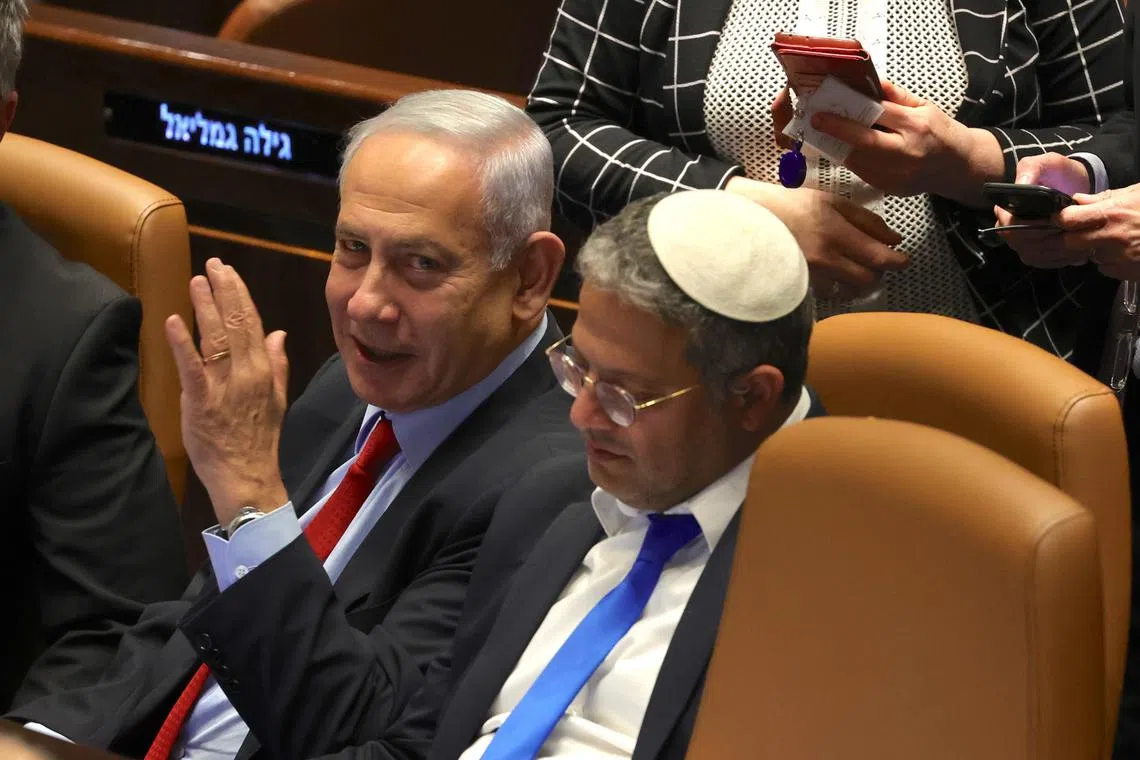Israel government advances judicial reforms decried by protesters
Sign up now: Get ST's newsletters delivered to your inbox

Israeli Prime Minister Benjamin Netanyahu (left) and National Security Minister Itamar Ben-Gvir, are pictured during the parliamentary vote.
PHOTO: EPA-EFE
JERUSALEM - Israel’s right-wing government pushed on in parliament on Wednesday with new judicial reforms that protesters decry as harming democracy
Lawmakers debated three new points of the divisive package, which Prime Minister Benjamin Netanyahu’s government argues is designed to limit judicial overreach.
A draft measure that would block the Supreme Court from halting ministerial appointments was discussed in a plenary session in the Israeli parliament, or Knesset.
In a contentious ruling in January, Israel’s highest court blocked the appointment of ultra-Orthodox politician Aryeh Deri as interior and health minister due to a previous tax evasion conviction.
Mr Netanyahu was forced to fire Mr Deri, but he criticised judges for overruling the will of voters and has yet to nominate a replacement.
The proposed amendment, which could pave the way for Mr Deri to reassume the ministerial posts, has therefore been dubbed “Deri 2“, following a previous law also tied to the Shas party leader.
The parliamentarians approved the new Bill in a preliminary reading, one of several required steps before it can become law.
Opposition lawmakers shouted “band of thugs” before some of them were ejected from the chamber.
The reforms are a cornerstone of Mr Netanyahu’s administration, an alliance with ultra-Orthodox and extreme-right parties which took office in late December.
Override
Lawmakers also adopted in preliminary reading a measure which would require a unanimous ruling by all 15 Supreme Court judges to strike down legislation, and only when it is deemed explicitly opposed to so-called Basic Laws, Israel’s quasi-constitution.
It would also allow the Knesset to override Supreme Court rulings that strike down legislation with a simple majority, and deny the court the right to review such a move.
A third plan discussed would place a unit investigating police misconduct under the direct authority of the justice minister rather than of the state prosecutor.
Some coalition members have accused the prosecution of politically motivated investigations.
On Tuesday, the parliament approved in a first reading two key provisions.
One of those measures would give the ruling coalition an outright majority in the committee that selects judges.
The other would deny the Supreme Court the right to strike down any amendments to Basic Laws, potentially preventing judicial review of the “Deri 2“ provision.
The judicial reform package has sparked weeks of mass demonstrations.
Israeli opposition leader Yair Lapid, the centrist former prime minister, on Tuesday labelled them an “attack on democracy”.
President Isaac Herzog – who, in his largely ceremonial role, has tried to broker dialogue on the divisive issue – said on Tuesday there was widespread “fear for the nation’s unity”.
UN rights chief Volker Turk urged Israel to pause the legislation, saying the proposed changes “would drastically undermine the ability of the judiciary to vindicate individual rights and to uphold the rule of law”.
Mr Netanyahu denounced Mr Turk’s comments as an “absurdity”, accusing him of bias.
Some of Mr Netanyahu’s critics have tied the reform plan to his ongoing corruption trial, arguing he is seeking to undermine a justice system he has accused of targeting him unfairly for political reasons.
Mr Netanyahu has denied the corruption charges and rejected any link between the reforms and his own trial. AFP


